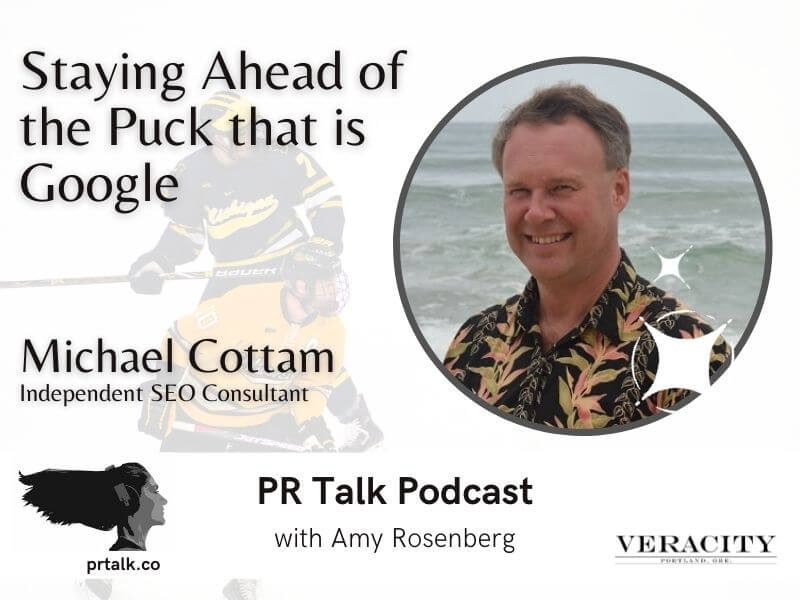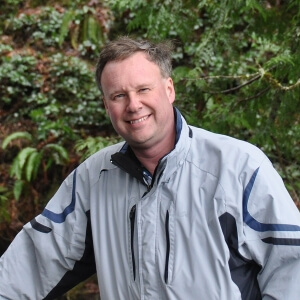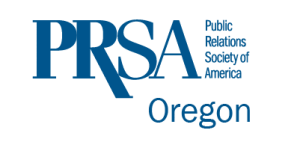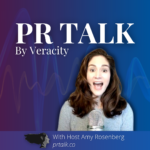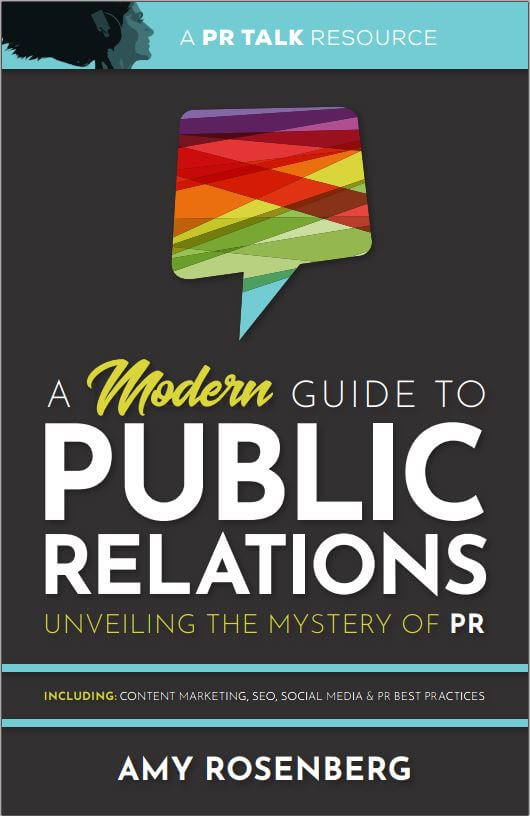Staying Ahead of the Puck that is Google with Michael Cottam
“I skate to where the puck is going, not where it has been.” — Wayne Gretzky.
Somewhere in the middle of the PR Talk conversation I had with Michael Cottam he cited this quote in reference to how he approaches search marketing. This means that Michael doesn’t just focus on what Google is doing, he broadens his view to what Google will be doing. There couldn’t be a more fascinating way to think about the ever-evolving topic of search, and especially how it relates to PR.
Michael Cottam is a renowned search engine optimization (SEO) expert who many in the search industry already know. Beyond providing highly-coveted search consultation for clients, Michael is the founder of Visual Itineraries, which he calls his SEO “sandbox” because it is where he tests search theories for clients.
Always full of great information, I am normally talking with Michael either at a busy conference or while collaborating on a mutual client. So I took this dedicated time to really dig in and get my questions answered. Even if my questions are in the weeds or are very technical, I don’t care because it will help us help Veracity’s SEO PR clients!
Battle of the SEOs: Does Michael Agree with Rand About Links?
First, I had to know if Michael agreed or disagreed with Rand Fiskin’s notion that links are not nearly as important as they once were for SEO (check out the last PR Talk interview with Rand titled “The Wall Street Journal Problem” for more context).
Michael wholeheartedly agreed with Rand.
The backstory is that Google used to rank web pages higher in search engines by relying on quantifying their external links. But now, Google has improved its ability to recognize quality content within web pages. While links are still important, websites that thoroughly cover specific topics will in turn rank for those specific topics.
Google’s E-A-T Attempts to Take the Consumer’s Place
Michael explains that in addition to links, Google is now considering “E-A-T,” which stands for “Expertise, Authority and Trust,” to rank web pages. For example, Google can determine the authority of a web page by attempting to discover who wrote the page and then follow a trail back to previous content by that author. If the author has written authoritative posts and been included (mentioned) as a source in other websites, Google will consider them an expert, thus trusting the page. Therefore, thought leader names are becoming just as important, or possibly even more important, than company names — in terms of establishing credibility and resulting SEO.
Since Veracity handles a lot of guest article placement for thought leaders, I wanted to dig into this concept further. I would think that name credibility could be built by landing many guest article placements. However, Michael said that interviews (or getting names included in articles) by credible third-party sources (such as reporters) are just as important. You want a mix of both to build your thought leader’s name, as well as the company name.
The E-A-T concept allows Google to mechanically re-create what consumers would see along the decision-making process and ultimately what websites they would click on. In this way, Google essentially acts like a consumer to serve its customers (web searchers).
Schema Markup Can Help Us Tier Press Lists
Back to my favorite topics of links, if all else is equal, of course you’d place more intrinsic value on the website article that also provides a followed link to your website. However, we could also review the “schema markup” (a type of structured data) of web pages. This hidden code enables search engines to understand what the page actually is about — so it can more readily appear in searches. For example, appropriate schema markup will tell Google that a webpage is really a press article, as well as who published and wrote it.
PR people should not inquire or advise press/web contacts about schema markup. This is a much bigger deal than simply asking the press to add a link into a previously written article. Additionally, there are ways we can discover who is using ideal schema markup in order to tier websites/press by using Google’s Structured Data Testing Tool or Rich Results Test to see if the site is using structured data (see more about these tools in this Search Engine Land article).
Are No-Follow Links the Devil?
For a long time we have been talking about no-follow links not being very great for SEO. However, Mike Rosenberg has been unsure about this for a while, so we posed the question to Michael Cottam.
He said that Google cares very much about “user-generated links” (links generated by others), which are found on social media sites, such as LinkedIn and Twitter, and on forums and places like Reddit and Quora. You want a mix of outside press (links and/or mentions from other websites) and buzz from user-generated links, which are no-follow, because they show what is hot right now.
However, there should be a natural bell curve pattern in the links. You don’t want to do a bunch of Facebook ads to generate comments and links for users at only one time. Ideally, you’d get some outside press coverage first and then share that article on social media (with some budget behind it) to show Google that people are also talking about you, which will increase the search impact of the original article.
We talked about so much more in the interview. More detailed questions — such as how to approach keywords when writing press materials — were answered. And larger topics, such as: 1) how search and PR teams can effectively work together, and 2) if search and PR could ever be combined into one role. That was an easy no!
Don’t Miss an Episode
You can access more great episodes by subscribing to the PR Talk podcast on iTunes, Stitcher, Google Podcasts, iHeart Radio and Spotify.
About the guest: Michael Cottam
Michael Cottam is the founder of Visual Itineraries, a sales closing and lead-generation tool for travel agents, and is an independent SEO consultant, focusing on technical organic search engine optimization, Panda optimization, and Google penalty recovery. The former SEMpdx board member is currently involved in the Rotary Club of Greater Bend, where he recently moved to be closer to the outdoors.
Connect and follow Michael on social media:
This episode of PR Talk is brought to you by PRSA Oregon
Throughout Oregon and Southwest Washington, PRSA provides members with networking, mentorship, skill building and professional development opportunities – whether you are a new professional fresh out of college or a skilled expert with 20 years in the industry. Check out PRSAoregon.org for more information on how membership can help you grow and connect.

